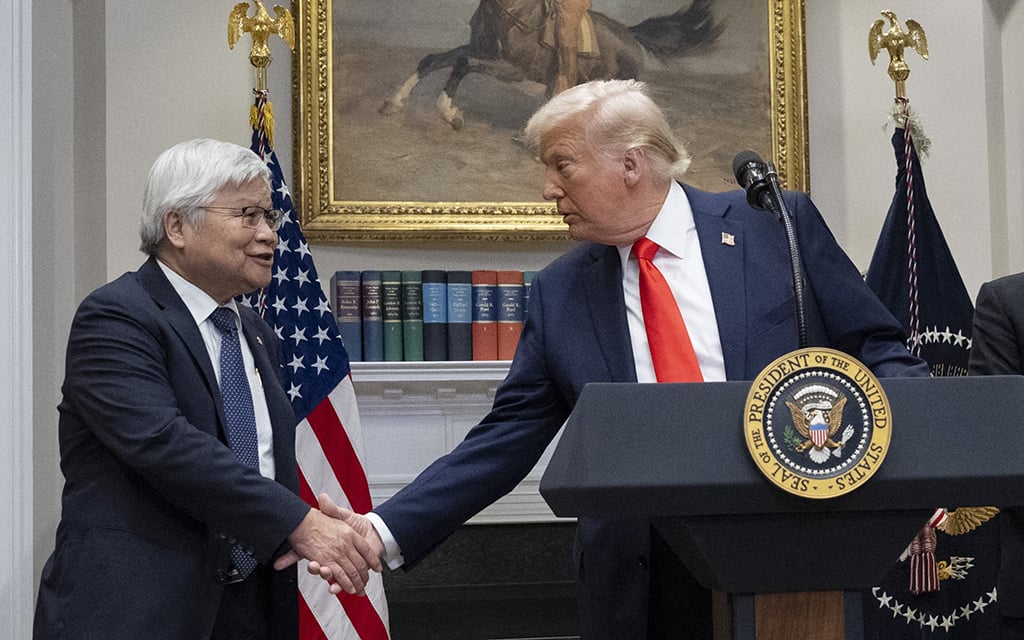WASHINGTON — Touting the $100 billion expansion TSMC announced on Monday, President Donald Trump boasted that he’d lured the chipmaker not with subsidies but with a threat of tariffs on imported semiconductors.
The Taiwan giant is already building a $65 billion complex in Phoenix with three fabrication facilities, or fabs. Much of the new investment will be used to add three more fabs.
“Yesterday, Taiwan Semiconductor … announced a $165 billion investment to build the most powerful chips on earth, right here in the USA,” Trump said in his address to Congress on Tuesday, adding the boast that “we are not giving them any money.”
Under the 2022 CHIPS and Science Act, the federal government pledged $6.6 billion to help TSMC expand its U.S. operations in Phoenix. Tuesday night, Trump called the law “a horrible, horrible thing” and urged Congress to scrap it.
To ensure that his successor couldn’t renege, President Joe Biden locked in the funding. TSMC chief financial officer Wendell Huang told CNBC the day before Trump took office on Jan. 20 that the company had already received $1.5 billion.
“In the fourth quarter, we already received the first batch of government support,” Huang said.
Last April, after the Biden administration announced the $6.6 billion subsidy, TSMC boosted its Phoenix plans from $40 billion to $65 billion.
TSMC is the world’s largest chipmaker, producing chips for Apple, Nvidia, Qualcomm and others. Its chips are used in smartphones, self-driving cars, high-end computing and artificial intelligence.
The first fab in Phoenix is already operational. The second is under construction. The company said last April that the third will be up and running by 2030.
The $165 billion investment Trump boasted about in his congressional speech includes the $65 billion TSMC committed well before his election to a second term.
Trump and TSMC CEO C.C. Wei announced the $100 billion increase at a joint appearance Monday at the White House. That will bring three more fabs to Phoenix, plus two advanced packaging facilities and a major R&D center that may go elsewhere.
The TSMC project was already the largest foreign investment in Arizona history.
“It’s going to mostly be in Arizona, from what I understand,” Trump said. “Which is a great state. I like it because I won it.”
The next evening, Trump told Congress he wants the CHIPS Act overturned.
“We don’t have to give them money,” he said. “They will come because they won’t have to pay tariffs if they build in America.”
The $280 billion package included $53 billion to boost domestic chip research and production.
Trump floated the idea of imposing tariffs on imported semiconductors shortly after taking office. He credits that threat with TSMC’s $100 billion expansion.
“They’ve got nothing but money,” Trump told House Republicans a week after his inauguration. “The incentive is going to be that they are not going to want to pay a 25%, 50% or even a 100% tax.”
Sen. Mark Kelly, D-Arizona, helped craft the law and decried Trump’s call to dismantle it.
“The CHIPS Act is what helped get TSMC to the U.S. and Arizona,” he posted online shortly after Trump’s speech. “Getting rid of the CHIPS Act would hurt the entire American microchip industry, including suppliers, American companies, and more. Plus, it unravels the years of bipartisan work it took to bring these investments to Arizona. “
Sen. Ruben Gallego, D-Arizona, asserted that Trump’s real motive is “just to be vindictive against Biden.”
The CHIPS Act has created thousands of good paying jobs. Donald Trump wants to get rid of it because he's mad it wasn't his idea. pic.twitter.com/NJFRdnXajL
— Senator Ruben Gallego (@SenRubenGallego) March 5, 2025
TSMC’s $100 billion plan set off an uproar in Taiwan, where its role as the world’s main chip supplier is viewed as essential to security – a so-called “silicon shield” against China, which views Taiwan as a breakaway province.
On Thursday, Taiwan President Lai Ching-te downplayed security concerns. Meeting with Wei, he told journalists that TSMC’s expansion is providing “opportunities for international cooperation and contributing to Taiwan’s greater strength.”

